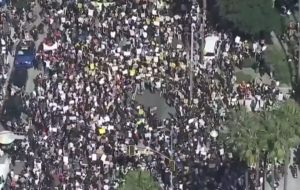
Published 05/11/2024 11:36 | Edited 11/05/2024 12:05
On the last day of the election, the United States goes to the polls this Tuesday (5) to choose between the Democratic candidate Kamala Harris and the Republican candidate, Donald Trump, in the most polarized election in the country’s history. Polls indicate a persistent technical tie in the presidential race between the current vice president and the former president.
The count in all 50 states is expected to be surrounded by legal challenges, requests to challenge and validate votes, disinformation and demonstrations by groups linked to the two candidates.
This situation worsens in seven swing states – Pennsylvania, Wisconsin, Georgia, North Carolina, Nevada Arizona and Michigan -, which should effectively resolve the election and where polls show a technical tie, with the candidates alternating in numerical leadership since the start of the campaign.
On the last day of the election, Kamala’s campaign has 226 delegates, while the Republicans have 219 – the result of the sum of states where the victory of one or the other is practically certain. What is at stake now are 93 delegates, distributed among seven states.
For the vice president, the easiest path is to win in Michigan (15 delegates), Pennsylvania (19) and Wisconsin (10) – guaranteeing 1 delegate from Nebraska, one of the few states that allows you to split your electoral college votes between two candidates .
As of Monday afternoon (4), more than 76 million people had already voted in advance. Of them, 41% registered as Democrats and 39% as Republicans. Another 20% did not declare themselves supporters of a party or data was not available, according to a survey by NBC News.
Amid all the uncertainty surrounding the elections, one of the few bets that analysts have the luxury of making is that the Republican will declare himself the winner, regardless of the results.
There is a strong fear of disturbances, such as intimidation of voters and employees working at polling stations. If Trump loses, the entire period until January 20, when the new president takes office, is expected to be turbulent.
Pennsylvania, for example, has become the breeding ground for both legal fights over voting rules and the spread of misinformation. The electoral college is classified as decisive in this year’s election.
Trump and his supporters have claimed that partisan polls and betting markets point to a “landslide victory,” as his main supporter, Elon Musk, recently said. The anticipation helps set the stage for disbelief and outrage among his supporters should he lose.
In a statement, Dana Remus, a lead lawyer for Vice President Kamala Harris’ campaign, said, “It is not surprising that he is already questioning the results of an election still in progress,” and added, “He failed when he tried to do so in 2020, and it will fail again.”
Source: vermelho.org.br

